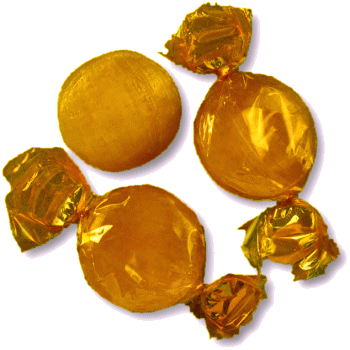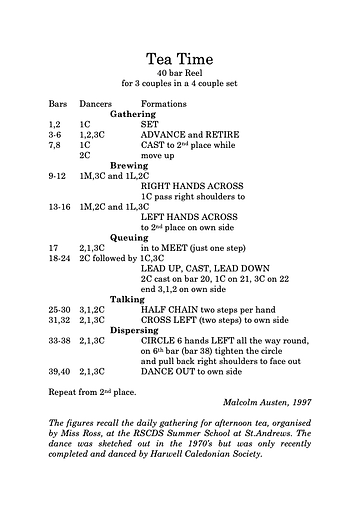




WELCOME TO An Entertainment Site for Scottish Country Dancers - Enjoy the curated selection of theme-related dances for celebrations and holidays, or find a dance associated with a special calendar day, or EVEN your own birthday!
Afternoon Tea, 1886. Chromolithograph after Kate Greenaway
Cream Tea Day
Jun 28
Other Scottish Country Dances for this Day
Today's Musings, History & Folklore
“Tea's proper use is to amuse the idle, and relax the studious, and dilute the full meals of those who cannot use exercise, and will not use abstinence."
~ Samuel Johnson, 1757
Fancy a cuppa? How times have changed! While a tea break is now considered an essential pick-me-up for morning or afternoon refreshment or a genteel ceremony with delicate sandwiches and pastries as accompaniments, in early 19th century Britain and Ireland, poor women who drank tea were considered as irresponsible and morally debased as whisky or gin drinkers! Women who drank tea, it was said, wasted their time and money, drawing them away from their duty to care for their husbands and home. Good heavens!
Pamphlets were even distributed to working and middle-class households lambasting tea drinking as a luxury poor women could not afford with dire warnings about possible addiction, illicit longings and even revolutionary sympathies! Throw caution to the wind, ladies! It's tea time! 🍵
Tea Time
Did you know that drinking tea was once considered an irresponsible, reckless pursuit for women?
In early 19th century, tea drinking for women, was considered a waste of time and money, and contributed to the luring away of servants and working girls away from their never ending husband and household duties.
Indeed, from the early eighteenth century well into the nineteenth century a debate raged among middle and upper-class commentators in both Ireland and the rest of Britain about the benefits (or otherwise) of tea drinking - and particularly about whether the lower classes should be allowed to drink tea at all!
The burgeoning popularity of tea, led to it being associated with all sorts of fears coupled to cultural, gender, and economic concerns of the time, and pamphlets were even distributed to households warning of the insidious health and moral dangers of tea.
The prospect of poor peasant women squandering already scarce resources on fashionable commodities such as tea was an economic concern for some, but also feared was the concept that tea drinking could even instill a form of revolutionary feminism in women. The supposedly drug-like qualities of tea, an exotic substance from China, was feared to have an addictive quality (on the susceptible lower classes). The English also worried that tea, or specifically, poor women drinking tea, might threaten the wholesome diet of British peasants, overturn hierarchies and be at the root of a secret revolutionary society. English reformers were equally worried about sugar - for sweetened tea - and its connotations with slavery and the controversial plantations of the West Indies.
The health arguments against tea had their origins in a 1706 a book by a French doctor, "Wholesome Advice against the Abuse of Hot Liquors," in which he warned against the dangers of tea, coffee and hot chocolate.
In the late seventeenth century, great medicinal claims had been made for hot drinks, including tea, and this book was a response to them, arguing that though while moderate consumption could be beneficial, an excess of hot drinks caused the blood and insides to heat up and that an 'Excess of Heat is the most Common Cause of Sickness and Death'. The doctor noted, 'The name of Phlegeton, one of the rivers of Hell, coming from a word that signifies to Burn, denotes, That the Abuse of Hot Liquors contributes very much to People the Kingdom of Death'.
The potential health considerations added weight mostly to anti-tea reformers who preached the dangers almost exclusively to the lower classes, fueled more by economic, gender, and class concerns than solicitousness for the health of the poor. Taking tea breaks amongst the lower classes was a sign of moral lassitude, an aping of one's betters, and preachers and reformers linked the drinking of tea with the drinking of gin.
But despite all these warnings, the drinking of tea as a safe and healthful beverage flourished, and by the time tea was ensconced as part of the staple diet of the poor and middle class, tea-drinking had evolved into an elaborate social occasion amongst the rich and upper classes.
Ironically, as the popularity of strong wines such as port among the upper classes, and of spirits, particularly gin, among the working classes, also increased, the same fears originally attributed to tea transferred to the "demon liquor." Inspired primarily by upper class fears that the gin-sodden working class would be difficult to control and unable to work, the temperance movement enlisted tea as an alternative beverage. Preachers of temperance urged people to sign a pledge to give up drinking alcohol, which often took place place at mass meetings, where tea would be served.
For more on the shocking business of tea-drinking women, click the painting of "The Tea Party" by Frédéric Soulacroix (1858-1933).
Click the dance cribs or description below to link to a printable version of the dance!





